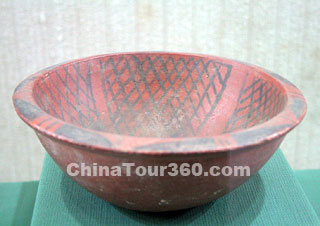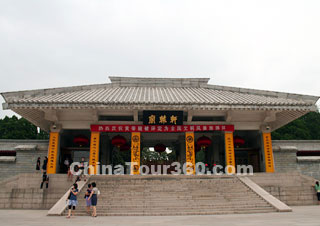For centuries, people have questioned the origins of the heavens, the earth and mankind. It is said that the human fossils discovered in Wushan County of Chongqing were the remnants of the earliest humans that lived in China. However, it is also theorized by some scientists that the Wushan remnants are possibly the remnants of an ape species rather than those of a human. But one thing is certain, China has some of mankind's earliest remains. In addition there are still other types of hominid fossils found all over China, such as Yuanmou Man, Lantian Man, Peking Man (see Peking Man Site) and Shandingdong (Upper Cave) Man.
In recent years, archaeological research has proved that Primates (ape) are the ancestors of mankind, who developed through the process of evolution. In the transition from ape to modern man, labor has played an important role. The earliest productive tools made by man were coarse chipped stones. Archaeologists named the period of making and using the chipped stone implements the Paleolithic Age (the Old Stone Age) and the period of producing and using the ground stone implements the Neolithic Age (the New Stone Age).
The Paleolithic Age began at about 2,500,000 years ago and ended approximately 10,000 years ago. This was a human's self-evolutive age. Developments in other social aspects were slow during this period. With the development of stone grinding techniques, human entered the Neolithic Age. In order to acclimatize to their new habitats, switching from mountainous areas to the flat plains, they built houses and made permanent settlements. They made a living by growing crops and farming rather than relying solely on hunting. Thus primitive agriculture developed.
Gradually, they adopted a group (tribal) structure for better survival-they worked together and shared food together. They chose capable men to be their leaders, someone who could organize collective work and defend against invasion. The Abdication System came into being around that time whereby an incumbent leader would recommend his successor, hence Yao recommended Shun, Shun recommended Yu the Great and so forth. Because this period was one of peace and equality, people sometimes refer to it as a society of 'Great Harmony'.

A Basin Excavated in Banpo Village, Xian
With the population increasing day by day, some people in the groups (tribes) detached themselves to form new clans and the clans with the same blood relationship combined to form the larger tribes. The clans living in the same places and times would have the similar lifestyle which eventually gave rise to the various regional cultures such as the Yangshao Culture distributed in the middle reaches of the Yellow River, the Banpo Culture distributed throughout Shaanxi Province and the surrounding areas, Hemudu Culture situated in the lower reaches of the Yangtze River, Dawenkou Culture distributed in the lower reaches of the Yellow River, and Longshan Culture located in the areas of Shandong, Henan, Shaanxi and Shanxi.
Around the 21st century BC, Yu the Great appears in history. Due to improvement of productivity, an unequal class structure began to form. In order to maintain the 'Great Harmony', Yu the Great adopted the Abdication System (electing the leader according to their ability) in politics. After his death, his son Qi abandoned this system for the sake of protecting their privileged class's own interest and established the Hereditary System which was adopted by the subsequent emperors in China and was maintained for about 4,000 years. The first hereditary dynasty established by Qi was called the Xia Dynasty (21st - 17th century BC).

Mausoleum of Emperor Huangdi
During the late period of this primitive society, a large number of clans recorded by the archaeologists as the Huaxia Group, which was composed of the Huangdi and Yandi tribes, lived in the middle and lower reaches of the Yellow River. Later, Huangdi tribes united the Huaxia Group and extended to the area of the Yangtze River. Yu the Great, the Xia tribe, the Shang tribe and the Zhou tribe were all the descendants of the Huangdi, thus the Huangdi are regarded as the common ancestors of the Chinese nation and nowadays Chinese people often refer to themselves as 'the offspring of Yandi and Huangdi'.
![]() Go to the Xia Dynasty
Go to the Xia Dynasty







